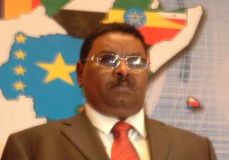Sudanese intelligence chief was in London for treatment – report
By By Francis Elliott, Whitehall Editor
Nov 26, 2006 (LONDON) — Britain has twice allowed a Sudanese intelligence chief named by the United Nations panel investigating war crimes in Darfur to visit London for medical treatment and secret talks about al-Qa’ida.
 Salah Abdallah “Gosh” has been accused of failing to stop the mass murder of 300,000 people and making a further two million homeless in Sudan.
Salah Abdallah “Gosh” has been accused of failing to stop the mass murder of 300,000 people and making a further two million homeless in Sudan.
A UN panel of experts recommended Sudan’s chief of security and military intelligence face international sanctions two years ago. But Salah Abdallah, a former associate of Osama bin Laden, is being protected by US, British and French intelligence service, according to former US officials.
The full extent of his special treatment was laid bare last week when the Foreign Office admitted it had granted him two visas to visit Britain in the past nine months.
Although ministers insisted the visits were for “urgent medical treatment” they admit that he met “UK officials” during his time in London.
Salah Abdallah was flown by the CIA to the agency’s headquarters in Langley, Virginia, in 2005. But the visit of the head of Sudan’s secret police to Washington caused such an outcry that he was banned from revisiting the US.
Britain has proved to be more accommodating. In March, Salah Abdallah visited the private Cromwell Hospital in central London. It is believed he consulted a cardiologist. The nature of his second “urgent medical treatment” in August is not known.
On both occasions the man who was Bin Laden’s main contact in Khartoum in the early 1990s spoke to US and UK officials.
Lord Triesman, the Foreign Office Minister for Africa, described him as “an influential member of the Sudanese government”, and said it was right that the Government raised its concerns over Darfur with him.
Just how influential is detailed in a Human Rights Watch report on Sudan. “Security controls this country,” it says. “The power is in Salah Gosh. He can overrule the army and military intelligence.”
The respected organisation alleged his service was complicit in murderous attacks carried out on Darfuris by the Arab militia known as Janjaweed.
“Sudanese security officials have, for many years, been implicated in serious human rights abuses, including arbitrary detention and torture. Selected security agents are believed to be liaisons with the Janjaweed leaders.”
The UN panel ranked him number two in a list of “identified individuals” who should be held accountable for the Darfur killings. It accused him of “failure to identify, neutralise and disarm non-state militia groups in Darfur”.
Andrew Mitchell, the shadow International Development spokesman, is now pressing the Foreign Office to reveal who, exactly, Salah Abdallah met on his visits. “We need to understand why he wasn’t immediately arrested and sent to the International Criminal Court in The Hague.”
Mohammed Yahya, a Darfur survivor-turned-activist, said: “I have seen members of my family killed as a result of Salah Gosh’s policies.”
Dr James Smith of the Aegis Trust, which campaigns to prevent genocide worldwide, said: “I am staggered that the British government, with full knowledge of his role, arranged for him to have medical treatment in British hospitals.
“Perhaps he is offering titbits of information, but our policy should be to stop terror wherever it happens. History will cast a shadow of disgrace over the British for turning a blind eye to this mass murderer.”
Gillian Lusk, a former deputy editor of Africa Confidential, has followed Salah Abdallah’s career from his days as a violent Islamist student in Khartoum University.
She said: “It seems unlikely that Britain and the US’s ‘intelligence co-operation’ with Sudan’s Islamist regime will bring much of great use in counter-terrorism: Khartoum is expert at running rings around the international community, and the 300,000 to 500,000 people who have died in Darfur have paid the price of this co-operation.”
(The Independent)
